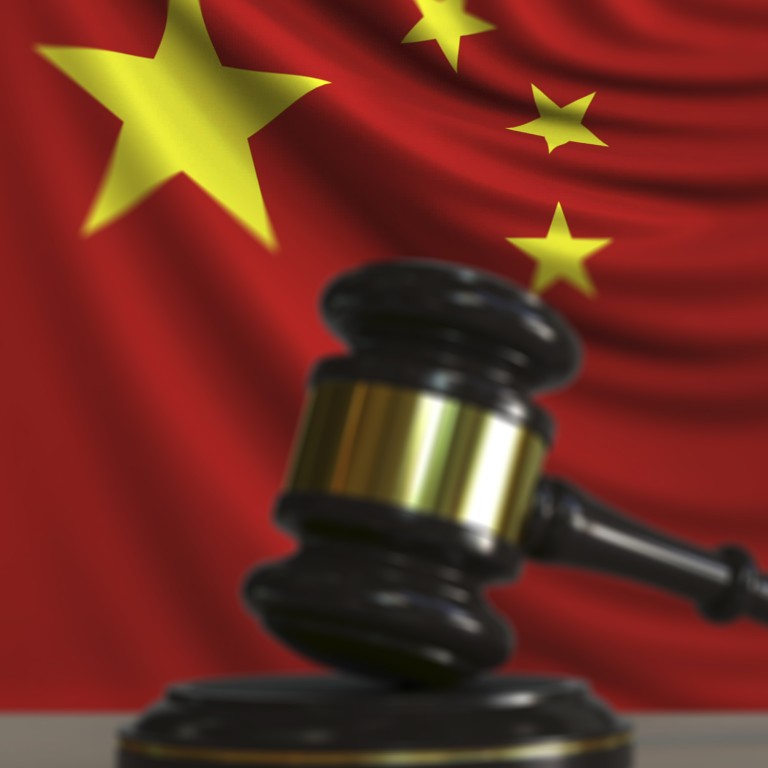
Reciprocal deal between Hong Kong and mainland China will recognise court rulings on either side for cross-border disputes
- Move comes amid increasing business ties between local and mainland firms, as well as foreign capital registered in city
- But disputes will be handled on a case-by-case basis with the right to refuse judgments by either side
Hong Kong and mainland China signed a reciprocal deal on Friday that would recognise and enforce judgments in civil and commercial cases on either side of the border, effectively allowing parties to seek damages in each other’s jurisdictions.
But according to the agreement signed between Hong Kong justice minister Teresa Cheng Yeuk-wah and Supreme People’s Court vice-president Yang Wanming, disputes will be handled on a case-by-case basis by either side, rather than as a blanket obligation.
Hong Kong courts will also reserve the right to reject a mainland court judgment if procedural unfairness is found, or vice versa.
The city’s courts may refuse to honour a mainland judgment if it is “manifestly contrary to the basic principles of the law of the HKSAR or the public policy of the HKSAR”.
The arrangement between the top mainland court and Hong Kong’s Department of Justice comes amid increasing cross-border trade and exchange between local businesses and mainland partners, or rising amounts of foreign capital registered in the city.
Further legislation is required for the law to come into effect.
The city’s lawyers generally welcomed the proposal as it was expected to boost Hong Kong’s attractiveness to multinational companies in settling commercial disputes in the city and enforcing such rulings on the mainland.
Hong Kong businesses and students struggling to access mainland market, poll finds
Currently litigants from other common law jurisdictions can ask Hong Kong courts to honour judgments made by foreign courts, and vice versa.
For instance, a British firm which has won a case in the country’s court can bring the ruling to Hong Kong and demand compensation from a local partner without launching a fresh challenge.
Hong Kong and the mainland run as two separate jurisdictions, with limited mutual legal help.
In 2006, Hong Kong and mainland China signed an agreement that allowed contractual parties the option to bring a court ruling from across the border into the city within two years, for instance, to seek damages.
[Mainland] courts may sometimes say: ‘Sorry, we don’t recognise this [Hong Kong] judgment and we will do nothing about it.’ And you’re stuck
But this clause had to be specified in the contract between sides. The scope later extended to the handling of marriage or divorce orders in 2017.
Commercial litigation lawyer Robert Clark said the law would be useful if local companies signed contracts with mainland partners without considering potential disputes, and later found themselves tangled in legal proceedings under unfamiliar mainland courts, particularly in dealings with state-owned enterprises.
He recalled clients winning cases in Hong Kong courts but facing difficulties at times collecting compensation or settling the case with mainland partners.
“[Mainland] courts may sometimes say: ‘Sorry, we don’t recognise this [Hong Kong] judgment and we will do nothing about it.’ And you’re stuck.” Clark, a partner at law firm Deacons said.
Once the new law is in place, a party who has won a case in a Hong Kong court could take civil or commercial matters ranging from contract to employment disputes, and register the judgment on the mainland, requiring that courts there honour the outcome.
But the new mechanism excludes matters related to arbitration, bankruptcy, estate, maritime and certain patent or intellectual property rights.
Senior counsel William Wong Ming-fung said closer ties between Hong Kong and the mainland required such an arrangement.
A lot of Hong Kong companies may run into a case involving mainland counterparts with assets in mainland China,
“A lot of Hong Kong companies may run into a case involving mainland counterparts with assets in mainland China,” Wong said.
He added that any criticisms or concerns about efficiency with mainland courts should be set aside first for important legal channels to be built, and improvements could be made later.
Wong and legal sector lawmaker Dennis Kwok said it was crucial to ensure Hong Kong courts had the final say on whether to take a mainland judgment on board.
Former Law Society president Thomas So Shiu-tsung said the new arrangement could attract multinational companies to resolve disputes in Hong Kong. He dismissed problems in litigating against a state-owned company and taking the ruling across the border.
“State-owned companies are often sued and are also suing others in Hong Kong,” So said. “On the mainland, I have also seen cases in which state-owned enterprises lose court battles.”
The new arrangement could be less costly as it allows parties to settle cases in court instead of going through arbitration, which is an increasingly popular mechanism for dispute resolution.
Arbitration, which is private and not done in court, can be expensive because of the need to appoint lawyers to sit in as arbitrators.

